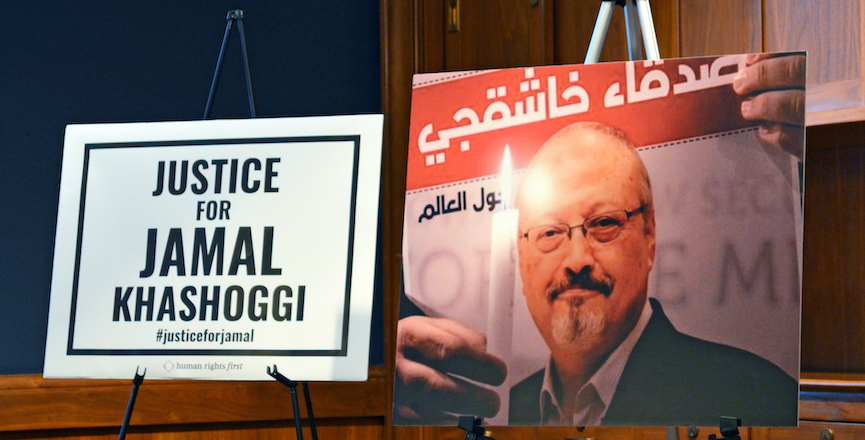One year ago today, on October 2, 2018 at 1:14 in the afternoon, American journalist Jamal Khashoggi walked into the Saudi Arabian consulate in Istanbul, where he’d been told he would be issued papers to marry his fiancée.
We now know that the Saudi-born columnist for the Washington Post was lured there under false pretenses. Waiting for him was a 15-person elite Saudi hit squad with orders to assassinate him, his penalty for daring to write columns exposing the thuggery of the Saudi royal family. The team included a forensic pathologist whose job was to cut the victim into pieces.
Turkish authorities have audio tape recorded inside the consulate that contains the unmistakeable sound of a bone saw doing its work. Khashoggi was brutally killed and dismembered 25 minutes after he arrived while his fiancée, Hatice Cengiz, waited for him outside.
To the great shame of the world, Saudi Arabia, which the American CIA says authorized the assassination at its highest level, has not been made to pay any price for this atrocity.
To the great shame of this country, Canada has been complicit in turning a blind eye.
Although Foreign Affairs Minister Chrystia Freeland condemned the murder, she emphasized that Canada will take no steps to punish Saudi Arabia — and certainly wouldn’t jeopardize a pending $14.8-billion contract to sell Canadian armoured combat vehicles to the kingdom.
Freeland, a former journalist, issued a statement that said “when it comes to existing contracts, our government believes strongly that Canada’s word has to matter.” Cancelling the Saudi arms deal would carry financial penalties and jeopardize up to 3,000 jobs in southwestern Ontario.
Similarly, the Trump administration decided to go ahead with more than $8 billion in military sales to the kingdom, sidestepping a congressional review process. The U.S. Senate, which had earlier unanimously passed a resolution holding Saudi Arabia’s Crown Prince Mohammed bin Salman responsible for the murder of Khashoggi, failed to override Trump’s veto of three resolutions to stop the arms sales passed by Congress.
Although the CIA concluded that the murder was authorized at the highest level of Saudi government, and a UN investigation concurred, U.S. President Donald Trump stated that he didn’t believe the crown prince ordered the murder because the Saudi leader told him repeatedly that he did not.
MBS, as the crown prince is known, has offered only a meaningless general statement of responsibility. “It happened under my watch. I get all the responsibility, because it happened under my watch,” he told Martin Smith of PBS in a December interview that was released last week.
He gave a similar interview to CBS’s 60 Minutes that was broadcast Sunday. He took ultimate responsibility for the death of Khashoggi but denied ordering it, and said he couldn’t possibly know what all three million government employees were up to. He sidestepped the obvious follow-up question — surely he would know what his immediate entourage was up to. The hit team of 15 Saudis apparently included some of Salman’s closest advisers.
Saudi Arabia has charged 11 people with involvement in the killing and says it is seeking the death penalty for five defendants. But the trial is taking place behind closed doors and the identities of those charged have not been released. There is limited press freedom in Saudi Arabia, and any reporting that casts doubt on the government’s version of events would be deemed illegal.
Meanwhile, it’s business as usual, with the U.S. administration going out of its way to show support for Mohammed bin Salman and Saudi Arabia. Secretary of State Mike Pompeo flew to Riyadh in January to shake the prince’s hand. Trump shook the same hand in June.
Khashoggi’s fiancée, Hatice Cengiz, has spent the last year travelling the world “seeking the truth and calling for justice,” but laments that “not a single material step has been taken toward punishing the real perpetrators.”
We should all ask ourselves why not.
From media executive to media critic, John Miller has seen journalism from all sides (and he often doesn’t like what he sees). He draws on his 40 years in news, including five years as deputy managing editor of the Toronto Star, and 10 years as chairman of the School of Journalism at Ryerson University. His 1998 book Yesterday’s News documented how newspapers were forfeiting their role as our primary information source. This column originally appeared on John’s blog.
Image: POMED/Flickr



